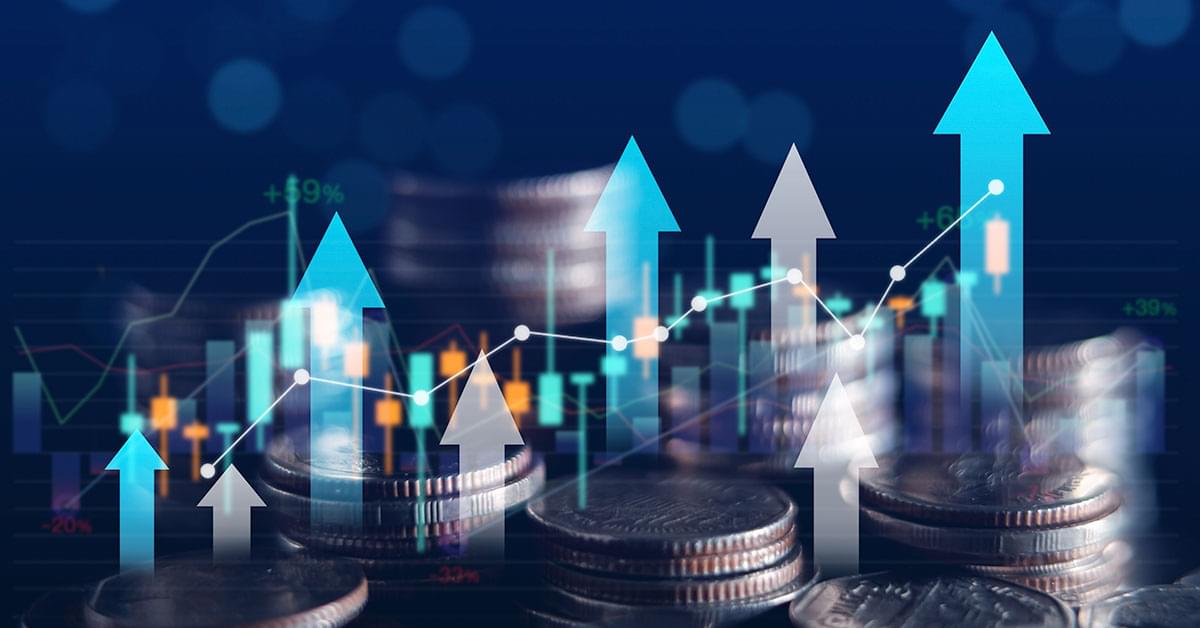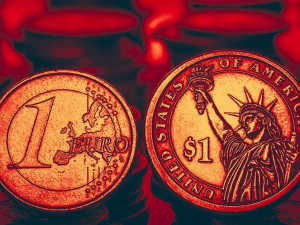
Due to inflation and economic growth, the world economy has been consistently growing since records began. Particularly after the baby boom after the Second World War, there has been a sharp increase in the population and economic output of nations.
But this raises the question – will the world economy keep growing? And will the economy ever stop growing? We explore this question in our latest article.

Defining economic growth
Traditionally, economic growth is measured by gross domestic product (GDP). This represents the total value of all goods and services produced over a specific period.
Observing the GDP of the US from 1930 to 2019, you can see a clear exponential growth of the country’s GDP. While the US has recorded incredibly high GDP growth, this is true of many countries since the mid-20th century economic boom.
What drives growth?
Growth is driven by advancements in technology, productivity and population growth. The accumulation of capital also drives growth as central banks become wealthier as a country profits from trade. A country and its economy always want to be growing, and all successful countries will be growing. Weak or negative growth is defined as a recession.
Global GDP growth has been predicted by the Global Economic Outlook to be at 2.8% as of March 2024. World growth was initially stunted by the Covid-19 pandemic, but has slowly been brought back on track.
Growth is also driven by increasing the number of workers, essentially, always trying to tackle unemployment. Worker productivity generally oversees an increase in GDP per capita.
As demonstrated earlier, growth in the US has been strong, mainly driven by technological innovation, but also increases in the working population, as well as productivity gains.
Can the economy grow too fast?
Yes, an economy can grow too fast. This is an economic phenomenon referred to as overheating.
An economy is in a state of overheating when producers are producing in excess, therefore creating production capacity beyond sustainable levels. It can also cause insufficient supply allocation in some areas, as due to the increase in consumer wealth, spending is also in excess.
Overheating of an economy can have some disastrous consequences:
Inflation
Inflation often starts to rapidly rise in a state of overheating. As there is an abundance of resources and consumer wealth, spending and production are massively increased and tend to exponentially increase. Inflation can very quickly lose control of itself and start to snowball.
Asset bubbles
Due to the increased production, asset bubbles can form as investors speculate on rising prices and risk-taking increases. Asset bubbles can be incredibly destructive to an economy, and can often be the trigger for a widespread economic meltdown.
Resource scarcity
Due to the frenzy of production and spending, while certain produce may be in abundance, other materials or resources may become scarce – particularly if they are imported.
The increase in production can also drain a country of its natural resources, beyond what they might ordinarily use. They might also adopt unsustainable practices
This can often happen with petrostates such as Venezuela, where the abundance and profit of a natural resource can cause huge growth, but unsustainable growth, which ultimately leads to economic turmoil.
Environmental damage
The increase in production, particularly industrial, can cause irreparable damage to the country’s environment, and leave the natural landscape barren.
Sustainable growth and practices that protect environments from destructive mining or waste disposal are essential for the survival of an economy. These factors are what contribute to a country having a green economy.

Can the economy grow indefinitely?
The global economy has seen exponential growth, particularly in the last few decades. Technological innovation and population growth, combined with productivity have seen growth skyrocket.
But regardless of overheating, even with stable growth the question remains – will growth reach a point where it uses up all the Earth’s resources?
Most economists agree that value production is a better measure of growth in the modern world, and this is where the growth of the economy can be measured.
Producing value
Economic output is not necessarily based on input (resources), but rather on value creation. Economies have become more efficient over time at creating value, so theoretically if we can keep upgrading industry and growth, then the resource input can remain the same.
Increasing efficiency can be done by inventing new technologies and finding new ways to produce goods and services with fewer resources.
However, the issue is that despite the value-driven output of economies seemingly reducing resource usage, this in turn tends to increase demand, as more consumers want better products.
Therefore, many economists agree that the economy cannot grow forever. Eventually, the limit for value and efficiency will be reached, and the finite resources of the planet will be depleted. This leads many to take a post-growth stance on economics, to essentially re-engineer the economy to prioritise societal wellbeing, as opposed to economic growth.
Post-growth
Post-growth is a stance in economics against the seemingly indefinite growth of the economy, which is not only feared to be finite but in many ways inefficient and damaging to the planet.
While economies and populations still have room to grow, resources are still not running out, and value and efficiency are still being created, there is a deadline somewhere in the future.
Post-growth economists try to move economic measurements away from GDP and push towards measuring the standard of living, which is measured by indexes such as the Human Development Index (HDI), and the Quality of Life Index (now referred to as the Where-to-be-born Index).
Measurements such as these change the psychology of measuring growth and aim to change the perception of a successful economy having high growth, to one that has high social welfare, efficiency and overall happiness.
Conclusion
For more articles on currency and economics, make sure to stay posted on our weekly articles at CurrencyTransfer in our Expert Analysis section. We also post daily updates on the market with our Market Commentary.
Sign up for an account with CurrencyTransfer today for free, and you’ll be assigned an account manager who will help you every step of the way.
Caleb Hinton
Caleb is a writer specialising in financial copy. He has a background in copywriting, banking, digital wallets, and SEO – and enjoys writing in his spare time too, as well as language learning, chess and investing.



